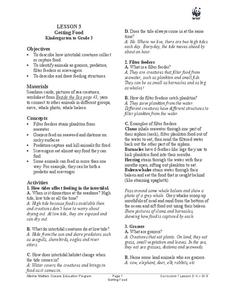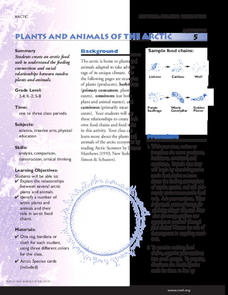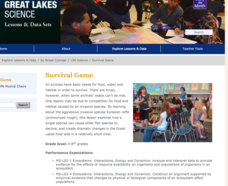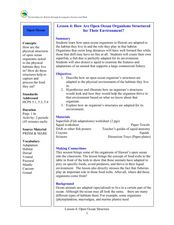Curated OER
Food Web Mobile
Students explain the main concepts of food webs and food chains. They
describe the role of animals, plants, and other organisms in cycling energy and matter through a food web by creating mobiles. Lesson contains adaptations for all levels.
Curated OER
Ocean Life Food Web
Students construct a food web representative of the Gulf of California. They use pictures to depict all of the organisms in the appropriate level of the web (producer, primary consumer, etc.)
Curated OER
Food Chains
Learners take a look at the relationship between organisms in food chains, food webs, and energy pyramids. After an opening demonstration by the teacher, pupils are split up into groups. Each one is assigned an environment such as:...
NOAA
Build Your Own Ocean Ecosystem
Hold the sea in the palm of your hand! Amateur oceanographers work together to create models of an ocean ecosystem in the sixth and final installment in a series. Raise awareness of global ocean health issues through guided research,...
NOAA
An Ocean of Energy
Young biologists trace the path of the sun's energy through marine ecosystems in the second part of this four-lesson series. Building on prior knowledge about producers, consumers, and decomposers students are introduced to the concept...
Curated OER
Rocky Shore Food Web Drama
Students explore food chains. In this ecosystem lesson plan, students discover how plants and animals rely on each other for survival. Students research the rocky shore ecosystem and create a skit representing the ecosystem.
NOAA
Deep-Sea Ecosystems – Entering the Twilight Zone
Imagine an ecosystem without any light or oxygen, where living things convert carbon dioxide into food. This ecosystem is thriving and might just be the largest ecosystem on our planet, yet we know very little about it. The lesson...
NOAA
Animals of the Fire Ice
When the sun's rays can't reach the producers in a food web, where does all the energy come from? Extreme environments call for extreme food sources. Young scientists investigate creatures that appear to get their energy from methane...
Curated OER
Getting Food
Students complete activities to learn about the ocean food web. In this ocean life lesson, students discuss how the tides affect feeding, learn about filter feeders, grazers, predators, and scavengers. Students then group the animals...
Curated OER
Introduction to Ocean Grazers
Students explore biology by creating a poster with classmates. In this oceanography lesson, students identify the importance of coral reefs to the ocean's ecology and examine a food web of ocean animals. Students define a list of...
Curated OER
Water is Life
Krill is a very small ocean animal that is key to keeping the ocean ecosystem going. The class reviews food webs and chains, learns about the importance of krill, discusses krill anatomy, builds a model of a krill, and then has a...
NOAA
Sustaining Our Ocean Resources
Lead young scientists on an investigation of fishery practices with the final installment of this four-part unit. Using a PowerPoint presentation and hands-on simulation, this activity engages children in learning how fish populations...
National Wildlife Federation
Plants and Animals of the Arctic
The Arctic food web may be more limited than other environments, but it has all the same components. With an interactive activity, pupils assume the roles of the components of an Arctic food chain. They move around and link themselves to...
Forest Foundation
The Web of Life
Producers, herbivores, carnivores, omnivores, decomposers. To begin a study of the forest ecosystem, learners examine the connections among the members of ecological communities.
Curated OER
A House for Me- Ocean Environments
Students explore ocean environments. In this ocean environment lesson, students identify the things ocean animals need for survival. Students use KWL charts and search the Internet collecting information about ocean habitats. Students...
Curated OER
Bering Sea Buffet - A Foodweb Activity
Life in the Bering Sea, food webs, and the ocean ecosystem are introduced with a map activity. The lesson starts as kids explore maps and images of the Bering Sea, then it kicks into high gear as they start to discuss the types of...
Polar Trec
Plankton Parents
Plankton are so abundant in the ocean they outweigh all of the animals in the sea. In this three day activity, groups discuss and become familiar with plankton, capture females, and look for egg production on day three.
Science Matters
That’s An Otter Story
Young scientists discover how sea otters' habitats have changed due to human impact. Through conversation, video observation, and story reading, scholars identify how human interactions change a specific ecosystem in both positive and...
Michigan Sea Grant
Survival Game
Musical chairs may be a classic game, but Ruffe Musical Chairs is a unique lesson on invasive species! Using the time-honored game, pupils role play the behaviors of the invasive fish called Eurasian ruffe. Learning about this aggressive...
Ocean Explorer
Living with the Heat
Young oceanographers study the Submarine Ring of Fire, which is a series of deep-water volcanic vents that come up from the ocean floor. Learners take a close look at the unique ecosystems that are associated with these areas, how these...
Curated OER
How Are Open Ocean Organisms Structured for Their Environment?
Students explore biology by conducting an animal dissection. In this oceanography lesson, students identify the life cycle of a squid and other animals that are involved with commercial fishing. Students dissect a squid in class and...
Curated OER
Hawaii's Freshwater Animals - Species Report
Students explore biology by creating a report for the class. In this oceanography lesson, students research and identify the survival characteristics of a list of freshwater animals by utilizing the Internet and library. Students...
Curated OER
Imagine a Kelp Forest
Students write a story based on their research of the kelp forest. In this ecosystem lesson, students view a video and research the kelp forest ecosystem. They write a short story imagining the discovery of a new species in the kelp forest.
Curated OER
Let's Go To Mexico
Students are able to use the Internet to conduct research. They research Mexican culture and traditions. Students compare and contrast Mexican and U.S. food and clothing. They convert United States currency to Mexican pesos. Students...

























